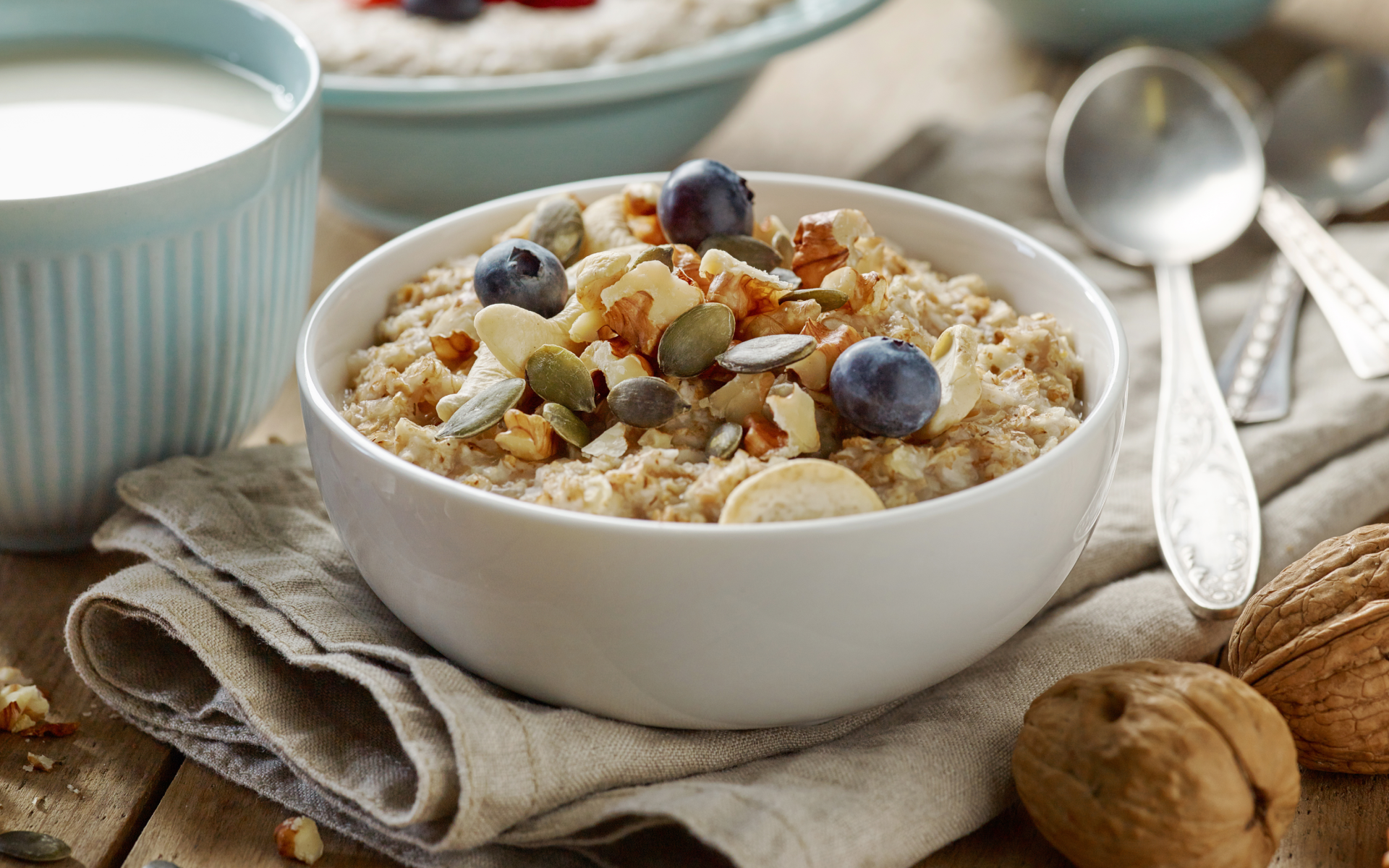People sometimes eat different numbers of meals during the day depending on a number of factors. Some prefer a higher meal frequency while others choose a lower meal frequency and their choices often focus on how they prefer to optimize fat loss or protein synthesis. Eating twice a day is a popular approach for those who prefer longer fasting periods.
Not only can the two meals per day approach support weight management, it can also offer a range of other benefits. In many cases, people choose to skip breakfast. They prefer to eat lunch around 12 pm or 1 pm and dinner between 6 pm and 8 pm.
In this guide, we’ll take a closer look at this eating pattern and its impact on digestion, cognition, energy, and meal planning.
What Are Some Benefits of Eating Twice a Day?
Eating twice a day is often associated with lower body mass index (BMI), easier digestion, enhanced cognitive functioning, and better productivity. Many people find that it gives them better control over their diet, as they only need to plan two meals, rather than three or more.
This strategy may restrict total daily calories, which can activate various biological pathways that promote good health. Here’s a list of the potential benefits of eating twice a day.
-
Reduced Body Weight
People who eat multiple meals a day tend to snack a lot. It’s easy to turn to comfort foods because they’re delicious, convenient, and make you feel good. However, this habit often leads to more calories being ingested than those being burned.
Eating twice a day to lose weight can help you maintain a caloric deficit while keeping you full.
A recent study showed that eating 1 or 2 meals a day reduced BMI more than eating 3 meals a day. Eating fewer meals can help you cut back on unnecessary calories, which can help remove unwanted pounds (1).
Then there’s the timing: When you space out your meals with longer fasting periods, you can optimize fat burning. The fasting period can stabilize your insulin levels and help the body tap into its stored fat for energy (2).
Read more: Time Restricted Eating vs Intermittent Fasting: Are They the Same?
-
Improved Digestion and Gut Health
Longer fasting periods between meals can give your digestive system a break. It cleans up any leftover food and bacteria, which allows your digestive tract to function more efficiently. This process can promote stool movement and may ease bloating (3).
As fasting changes when and how you eat, it can promote the growth of healthy bacteria in your gut. According to studies, it could help manage chronic inflammatory conditions, boost immunity, and reduce obesity (4, 5).
Eating two meals a day could help regulate insulin resistance. It can decrease excessive glucose production and curb inflammation. If you plan nutritious and balanced meals with regular physical activity, you could mitigate the risk of type 2 diabetes (6).
If you wish to free yourself from all the extra pounds that have been weighing you down for way too long, start using the BetterMe: Health Coaching app and overhaul your entire life!
-
Enhanced Cognitive Functioning
You may feel more functional and clear-headed in the morning if you fast until lunch. Breakfast may cause ups and downs in your blood sugar. Skipping a meal may help you avoid this problem and provide stable energy.
Fasting could also stimulate the release of brain-derived neurotrophic factor (BDNF), which is essential for memory and learning (7).
Research has shown that fasting mechanisms can influence many aspects of the central nervous system. They can promote cognitive functioning and prevent or manage brain-related disorders (8).
When your meals are well-balanced and highly nutritious, this eating pattern could ease mood disorders, depression, and anxiety.
-
Better Focus and Productivity
Your brain and body use different ways to trick you into eating. You may grab a dessert when you feel stressed, bored, or anxious and you may find yourself craving snacks when you’re scrolling on your phone, even when you’re not hungry.
Eating twice a day can promote mindful eating. It may also raise your self-awareness and self-discipline, so you can avoid overindulging.
With fewer meals to cook and eat, you may have more time and mental clarity to be more productive.
-
Simplified Cooking and Meal Planning
Eating two daily meals can drastically simplify your eating habits. You’ll spend less time in the kitchen chopping, cooking, and cleaning. It’s an efficient eating pattern for anyone with a hectic schedule.
As you eat twice and skip snacks, you may need fewer ingredients than usual. This means you can save money with a simpler grocery list and fewer trips to the store. Instead of spending your time rummaging through the pantry, you can focus on other tasks.
-
Better Structure and Organization
This eating pattern can help you create a personalized approach that is based on your lifestyle and food-related preferences.
If you’re a morning person, you can have breakfast and lunch, but if your body feels more comfortable with lunch and dinner, you can adjust meals and their timings to meet your needs. You can organize meals around your schedule for optimal energy.
To reap the benefits of eating twice a day, add more complex carbs, dietary fiber, lean protein, vitamins, and minerals to your meals. The BetterMe app can help with this. It offers nutrition plans with options such as intermittent fasting, vegetarian, low-calorie, and many more. You can use it to track everything from your first coffee to your favorite dish.
Is It Okay to Eat Twice a Day?
Yes, you can eat only two meals every day and still maintain good physical and mental conditioning. When you eat in this manner, the body can function quite well while experiencing proper digestion and stomach emptying.
However, for it to work, you must ensure the meals are nutrient-dense, balanced, and meet all your daily nutritional requirements. If not, you may experience nutritional deficiencies. It’s best to plan meals around your lifestyle and health conditions.
It’s important to give your body time to process food. Allow 3 to 4 hours after dinner before you sleep. Eating too close to bedtime can interfere with blood sugar control. You can experience a decreased production of gastric secretions, which can cause heartburn (9).
Eating late at night can also increase your chance of obesity.
Is 2 Meals a Day Healthier Than 3?
Not exactly. You can eat 2, 3, or even 5 meals a day and still be healthy. It depends on what you eat for those meals, the quantity of food, and how active you are. If anything, cooking fewer dishes can give you better control of your portions and calories.
For example, if you eat two balanced meals that are rich in whole grains, lean protein, and omega-3 fats, you can boost metabolic function. You can also manage your glucose levels to a higher degree, as you create a bigger gap between meals. Eating two meals a day gives your body enough time to digest the food, which can be difficult to achieve with regular snacking.
Read more: Eat Real Food Today: Simple Hacks To Eat Whole Foods
Will I Lose Weight if I Eat Two Meals a Day?
Eating two meals every day can restrict your calorie intake and help you shed unwanted pounds. You can control the portions to create a calorie deficit. This approach can help burn fat faster, particularly when done alongside regular exercise (10).
When your body gets used to fewer meals, it may be easier to manage food cravings. It could potentially reduce your desire for high-calorie foods. Over time, it can balance your hormonal response to frequent snacks and overeating (11).
However, the quality and amount of food you eat matters more than the number of meals you eat. If your diet consists of predominantly processed foods with simple sugars and high sodium, you may find it difficult to lose weight.
Whole foods, healthy fats, lean protein, whole grains, and complex carbs can keep you fuller for longer and will help to keep your metabolism healthy.
How Can I Determine How Many Times I Should Eat per Day?
Do what works for you, your schedule, and your body. Adopting a two-meals-a-day timing strategy may fit your natural hunger patterns. For example, if you feel quite hungry in the morning and can’t be productive without food, eat a hearty breakfast, but if you need consistent energy during the day, you can opt for a nourishing lunch.
A specific health condition such as diabetes may require some moderate adjustments. Meal timing and frequency can affect your glucose and insulin levels. Therefore, it’s best to choose the number of meals that can manage specific health problems based on your age, weight, and fitness level.
What Should Be the Biggest Meal of the Day for Weight Loss?
Many people choose to eat a larger lunch and a mid-sized dinner. Consuming more calories during the day puts less pressure on the stomach. At this time, you’re most active and more likely to burn excess calories.
It can prevent dips in energy, boost metabolic rate, and stabilize glucose levels. You may feel a greater sense of fullness and be less inclined to enjoy unhealthy snacks.
A large dinner too close to bedtime can keep you awake at night and you may increase the risk of acid reflux, stomach pain, and weight gain if you mainly eat fatty, sugary, spicy, or acidic foods.
Whether you’re a workout beast or just a beginner making your first foray into the world of fitness and dieting – BetterMe has a lot to offer to both newbies and experts! Install the app and experience the versatility first-hand!
Why Am I Gaining Weight if I Only Eat Twice a Day?
Healthy weight loss is more than just consuming fewer calories — it involves making sustainable changes that offer long-term results. If you’re eating two meals a day and are still gaining weight, there could be several reasons:
- Sitting Too Much: Inactivity can cause rapid fat accumulation. It reduces calorie expenditure and can slow your metabolic rate. The longer you remain inactive, the higher the circulating insulin, which is associated with overall weight gain. Your body needs at least 150 minutes of moderate aerobic activity every week.
- Hitting Your Weight Loss Plateau: You may reach a plateau after restricting calories. To continue making progress, you may need to increase exercise intensity or duration or adjust the calories you eat throughout the day.
- Underestimating Calories: Even if you eat fewer meals, you can still consume more calories than you realize. Nut butter, dates, full-fat cheeses, and fatty cuts of meat contain many calories. They also take longer to digest. It’s best to weigh your portions and track your calories to avoid underestimating calories.
- Ignoring Water Retention: Excess water causes you to feel bloated and puffy. The fluid can stay in your feet, stomach, and hands, which can create an illusion of extra body fat. Try to limit salt intake, drink more water, and consume natural diuretics to avoid unwanted water retention.
- Losing Sleep: Sleep deprivation can disrupt your hormonal balance. It can affect your digestive tract and sabotage weight loss. If you regularly consume a balanced diet and have a proper fitness plan but still can’t lose weight, try to work on your sleeping habits.
- Stress and Medical Conditions: Psychological distress, polycystic ovary syndrome (PCOS), or hypothyroidism can make it difficult to slim down. Consulting a healthcare expert may help.
It’s perfectly fine to skip meals occasionally. However, extreme dietary restrictions can be incredibly unhealthy. You may experience short-term weight loss, but you’re more likely to overeat once you resume your normal dietary regimen. It’s different for everyone. People usually skip breakfast because they don’t have the appetite to eat in the morning. Others need breakfast more than dinner as it helps them start the day. Choose whatever option feels most comfortable for you. Skipping lunch every once in a while shouldn’t cause any serious problems. However, if you make it a habit, you may experience poor energy, focus, and concentration. You may be more likely to overeat the first chance you get if you make skipping lunch a habit. The healthiest foods are whole, natural, and nutrient-dense. They should include complex carbs, lean proteins, less sugar, and more dietary fiber. People who eat lunch may prefer to eat around 12 pm or 1 pm. They may also prefer to serve dinner before 8 pm. Frequently Asked Questions
Is it good to skip two meals a day?
Which meal is best to skip?
Can I skip lunch every day?
What is the healthiest eating schedule?
The Bottom Line
Practicing the two-meals-a-day approach can offer many potential perks. It can improve weight management, blood sugar control, and meal planning. It can also give your digestive tract more time to rest between meals, potentially boosting metabolic function and gut health.
However, individual responses to meals can vary. Some people prefer to skip breakfast and eat only lunch and dinner, while others opt for different frequencies that benefit a specific health condition. Consider your personal preferences and overall health before you make any drastic changes to your diet.
DISCLAIMER:
This article is intended for general informational purposes only and does not serve to address individual circumstances. It is not a substitute for professional advice or help and should not be relied on for making any kind of decision-making. Any action taken as a direct or indirect result of the information in this article is entirely at your own risk and is your sole responsibility.
BetterMe, its content staff, and its medical advisors accept no responsibility for inaccuracies, errors, misstatements, inconsistencies, or omissions and specifically disclaim any liability, loss or risk, personal, professional or otherwise, which may be incurred as a consequence, directly or indirectly, of the use and/or application of any content.
You should always seek the advice of your physician or other qualified health provider with any questions you may have regarding a medical condition or your specific situation. Never disregard professional medical advice or delay seeking it because of BetterMe content. If you suspect or think you may have a medical emergency, call your doctor.
SOURCES:
- The Influence of Meal Frequency and Timing on Health in Humans: The Role of Fasting (2019, nih.gov)
- Intermittent fasting and weight loss (2020, nih.gov)
- Short-Term, Intermittent Fasting Induces Long-Lasting Gut Health and TOR-Independent Lifespan Extension (2018, nih.gov)
- Effects of 10-Day Complete Fasting on Physiological Homeostasis, Nutrition and Health Markers in Male Adults (2022, nih.gov)
- Changes in human gut microbiota composition are linked to the energy metabolic switch during 10 d of Buchinger fasting (2019, nih.gov)
- Intermittent fasting: is there a role in the treatment of diabetes? A review of the literature and guide for primary care physicians (2021, nih.gov)
- The Impact of Intermittent Fasting on Brain-Derived Neurotrophic Factor, Neurotrophin 3, and Rat Behavior in a Rat Model of Type 2 Diabetes Mellitus (2021, nih.gov)
- The Effects of Intermittent Fasting on Brain and Cognitive Function (2021, nih.gov)
- Timing of Breakfast, Lunch, and Dinner. Effects on Obesity and Metabolic Risk (2019, nih.gov)
- Intermittent Fasting and Metabolic Health (2022, nih.gov)
- Fasting diets: what are the impacts on eating behaviors, sleep, mood, and well-being? (2024, frontiersin.org)













